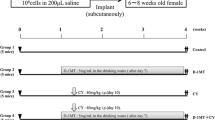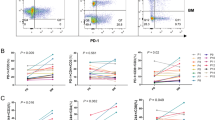Abstract
Indoleamine 2,3-dioxygenase (IDO), a catabolizing enzyme of tryptophan, is a novel immunosuppressive agent blocking T-cell activation in neoplastic cells, including acute myeloid leukemia (AML) cells. IDO inhibitors as 1-methyl tryptophan (1MT) can abrogate IDO enzymatic activity and may result in an effective immune response. Mononuclear cells (MNCs) were separated from peripheral blood of 25 AML patients and 25 normal adults. IDO expression was detected by RT-PCR and its enzymatic activity by a colorimetric method. MNCs were cultured and the effects of Adriamycin, 1MT and a mixture of both on blast and lymphocyte cell counts after 24 and 72 h were detected. IDO mRNA and activity were detected in 52% of patients and absent in normal subjects. There was a significant correlation between IDO mRNA expression and its enzymatic activity in AML. IDO activity was correlated positively with patient’s ages and negatively with hemoglobin levels. There was a significant inhibition of blast cells proliferation with Adriamycin and more inhibition when combined with 1MT. The inhibition was more after 72 h more than 24 h of culture. However, using 1MT alone showed no significant inhibitory effect on blast cells, with a significant increase in lymphocyte counts. Our study confirms the role of indoleamine 2,3-dioxygenase in tumor-induced immune tolerance and points to the possible benefit of 1-methyl tryptophan as immunotherapeutic enhancing the anticancer effects of traditional chemotherapeutics.






Similar content being viewed by others
References
Liu X, Newton RC, Friedman SM, Scherle PA. Indoleamine 2, 3-dioxygenase, an emerging target for anti-cancer therapy. Curr Cancer Drug Targets. 2009;9:938–52.
Uyttenhove C, et al. Evidence for a tumoral immune resistance mechanism based on tryptophan degradation by indoleamine 2, 3-dioxygenase. Nat Med. 2003;9:1269–74.
Curti A, et al. Modulation of tryptophan catabolism by human leukemic cells results in the conversion of CD25− into CD25+ T regulatory cells. Blood. 2007;109(7):2871–7.
Corm S, et al. Indoleamine 2, 3-dioxygenase activity of acute myeloid leukemia cells can be measured from patients’ sera by HPLC and is inducible by IFN-gamma. Leuk Res. 2009;33(3):490–4.
Mellor AL, et al. Tryptophan catabolism and T cell responses. Adv Exp Med Biol. 2003;527:27–35.
Frumento G, et al. Tryptophan-derived catabolites are responsible for inhibition of T and natural killer cell proliferation induced by indoleamine 2, 3-dioxygenase. J Exp Med. 2002;196:459–68.
Chiesa MD, et al. The tryptophan catabolite l-kynurenine inhibits the surface expression of NKp46- and NKG2D-activating receptors and regulates NK-cell function. Blood. 2006;108:4118–25.
Wang J. Kynurenic acid as a ligand for orphan G protein-coupled receptor GPR35. J Biol Chem. 2006;281:22021–8.
Ino K, et al. Indoleamine 2, 3-dioxygenase is a novel prognostic indicator for endometrial cancer. Br J Cancer. 2006;95:1555–61.
Brandacher G, et al. Prognostic value of indoleamine 2, 3-dioxygenase expression in colorectal cancer: impact on tumor-infiltrating cells. Clin Cancer Res. 2006;12:1144–51.
Munn DH, Mellor AL. The tumor-draining lymph node as an immune privileged site. Immunol Rev. 2006;213:146–58.
Mckenzie SB. Advances in understanding the biology and genetics of acute myeloid leukemia. Clin Lab Sci. 2005;18:28–37.
Tang XQ, et al. Indoleamine 2, 3- dioxygenase activity in acute myeloid leukemia cells contributing to tumor immune escape. J Exp Hematol/Chin Assoc Pathophysiol. 2006;14(3):539–42.
Curti A, et al. Acute myeloid leukemia cells constitutively express the immunoregulatory enzyme indoleamine 2, 3-dioxygenase. Leukemia. 2007;21:353–5.
Chamuleau MED, et al. High INDO (indoleamine 2, 3-dioxygenase) mRNA level in blasts of acute myeloid leukemic patients predicts poor clinical outcome. Haematologica. 2008;93:1894–8.
Nilsson C, et al. Optimal blood mononuclear cell isolation procedures for gamma interferon enzyme-linked immunospot testing of healthy swedish and tanzanian subjects. Clin Vaccine Immunol. 2008;15(4):585–9.
Daubener W, et al. A new simple bioassay for human IFN-gamma. J Immunol Methods. 1994;168:39–47.
Bradford MA. A rapid and sensitive method for the quantition of microgram quantities of protein utilizing the principle of protein dye binding. Anal Biochem. 1976;72:248–54.
Kudo Y, Boyd CA. The role of l-tryptophan transport in l-tryptophan degradation by indoleamine 2, 3-dioxygenase in human placental explants. J Physiol. 2001;531(2):417–23.
Curti A, Trabanelli S, Salvestrini V, Baccarani M, Lemoli RM. The role of indoleamine 2, 3-dioxygenase in the induction of immune tolerance: focus on hematology. Blood. 2009;113(11):2394–401.
Broomfield S, et al. Partial, but not complete, tumor-debulking surgery promotes protective antitumor memory when combined with chemotherapy and adjuvant immunotherapy. Cancer Res. 2005;65:7580–4.
Dummer W, et al. T cell homeostatic proliferation elicits effective antitumor autoimmunity. J Clin Invest. 2002;110:185–92.
King C, Ilic A, Koelsch K, Sarvetnick N. Homeostatic expansion of T cells during immune insufficiency generates autoimmunity. Cell. 2004;117:265–77.
Brown IE, Blank C, Kline J, Kacha AK, Gajewski TF. Homeostatic proliferation as an isolated variable reverses CD8+ T Cell anergy and promotes tumor rejection. J Immunol. 2006;177:4521–9.
Beyer M, et al. Reduced frequencies and suppressive function of CD4+ CD25hi regulatory T cells in patients with chronic lymphocytic leukemia after therapy with fludarabine. Blood. 2005;106:2018–25.
Munn DH, et al. Expression of indoleamine 2, 3-dioxygenase by plasmacytoid dendritic cells in tumor-draining lymph nodes. J Clin Invest. 2004;114:280–90.
Muller AJ, DuHadaway JB, Donover PS, Sutanto-Ward E, Prendergast GC. Inhibition of indoleamine 2, 3-dioxygenase, an immunoregulatory target of the cancer suppression gene Bin1, potentiates cancer chemotherapy. Nat Med. 2005;11:312–9.
Friberg M, et al. Indoleamine 2, 3-dioxygenase contributes to tumor cell evasion of T cell-mediated rejection. Int J Cancer. 2002;101:151–5.
Zeng J, et al. Prevention of spontaneous tumor development in a ret transgenic Mouse model by ret peptide vaccination with indoleamine 2, 3-dioxygenase inhibitor 1-methyl tryptophan. Cancer Res. 2009;69(9):3963–70.
Author information
Authors and Affiliations
Corresponding author
Rights and permissions
About this article
Cite this article
El Kholy, N.M., Sallam, M.M., Ahmed, M.B. et al. Expression of indoleamine 2,3-dioxygenase in acute myeloid leukemia and the effect of its inhibition on cultured leukemia blast cells. Med Oncol 28, 270–278 (2011). https://doi.org/10.1007/s12032-010-9459-6
Received:
Accepted:
Published:
Issue Date:
DOI: https://doi.org/10.1007/s12032-010-9459-6




